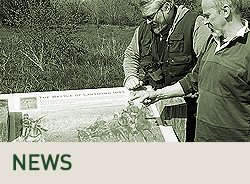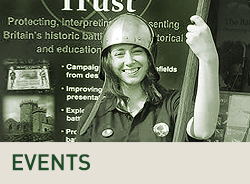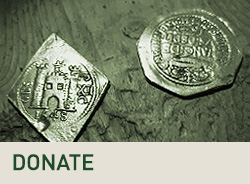James II's account
An account compiled by James II based on various reports by those involved.
[Monmouth] began to march as soon as it grew night, taking his way about, at the head of the moor, leaving Chedsy on his right hand; hoping by taking that compass, to surprise the King's troops; who, he believed, would not expect him that way, it being also the best way he could take to attack them, the strait way being a perpetual defile till they were very near Weston, the camp to which Lord Feversham had advanced with all the King's troops; which were about 1800 foot, in six small battalions, and some 700 horse and dragoons, leaving the Earl of Pembroke at Middlesea, and villages adjacent, with the militia, horse and foot. The post of Weston was a very well chosen one, for such a small body of men, and very secure, the foot being camped with their rear to the village, and had their front covered by a ditch, which serves for a drain to the moor; and though it was then a dry season, was not to be past by horse but in one or two places; and it was this drain deceived the Duke of Monmouth, for he not knowing of it, thought the foot lay open, and consequently the whole quarter.
...[Monmouth] had two defiles to pass after he was in the moor, the one presently after he came on it, and the other about a mile from the camp. He drew up in two columns after he had passed the first, the foot on the right, and the horse on the left, and so marched till he came to the second. There his horse passed over first, which were some eight squadrons; his cannon, which were but three small iron guns, marched over after them, at the head of the foot, which consisted of five great battalions, each of which had one company of at least one hundred scythemen, instead of grenadiers; the horse commanded by Lord Grey, with the title of Lieutenant General; the five regiments of foot, by Wade, Lieutenant Colonel to the Duke of Monmouth's own regiment; Matthews commanded the next, then Holmes, Buffet, and Foulks. As they were passing the last defile, the advanced centries of the horse‑guards discovered them, and gallopped back to advertise Sir Francis Compton of it, who immediately gave the alarm to the camp, and staid in his post till he received a faint charge from an advanced party of some of the rebels horse; who, after having fired their carabines, and received some shot from his party, went off on their side, and he drew back to the camp on the right hand of our foot behind the ditch. Whilst this passed, the Duke of Monmouth hearing the alarm was taken in the King's camp, ordered Lord Grey to march fast on with the horse to fall in amongst the tents of the foot, and to take them by the flanks, not knowing any thing of the ditch which covered them, and told him he would march after him with the foot as fast as he could. And now in the camp, so soon as they had the alarm, the foot stood to arms, and were in a moment drawn up in battle at the head of their tents, in very good order, and the horse were drawing out of the village as fast as they could. The foot were in six battalions; the first on the right was composed of Dunbarton's, one company of which were grenadiers, commanded by Lieutenant Colonel Douglas. Next to which were two battalions of the first regiment of guards, of six companies in each, besides one company of grenadiers of that regiment; at the head of the first of which was the Duke of Grafton their Colonel, and Eaton the Major of it, was at the head of the other. Next to them was a battalion of the second regiment of guards of six companies, and another company of grenadiers; at whose head was Lieutenant Colonel Sackville. Then five companies of Trelawny, one of which were grenadiers; commanded by Lieutenant Colonel Churchill. On the left of all was another small battalion, composed, as the former, commanded by Colonel Kirke. As for the horse, there were one hundred and fifty commanded out of the three troops of guards; sixty grenadiers on horseback, commanded by Villiers; seven troops of the King's regiment of horse; and four of dragoons; the horse commanded by Sir Francis Compton, and the dragoons by Lord Cornbury ... The train of artillery consisted of sixteen field‑pieces, under the conduct of Mr Sheers. And now whilst the King's horse were getting in order, the rebels horse, in pursuance of the orders they had received, marched on to put them in execution, and meeting with the ditch, came along by it, and being challenged by Douglas, who they were? some one answered Albemarle; at least he understood it so, and let them pass without firing at them. Then coming up to the first battalion of the guards, Captain Berkley, who commanded the right wing of the musketeers of it, asked who they were for? They answered, The King. He called to them, What King? They answered, Monmouth, and God with us, which was their word. He then said, Take this with you; and made his wing fire at them: So did the other wing of that battalion; as also the next battalion of the same regiment, and half that of the two regiments of guards. Upon which, that party of the rebels horse ran away, leaving some of their men and horses on the ground, by the fire they had received; but to this day it was not known certainly, whether it was only part, or their whole horse that came so up to the ditch; or whether it was part of them, or a fresh party of them, which were charged some time after, by a party of our horse.
As this happened, Lord Feversham, who had been getting the horse in order, and sent for the cannon, came to the foot, and ordered them to keep their fire till the enemy came close up to them. Soon after this, the rebels foot came up, but not in good order; for the Duke of Monmouth would not stay after they had passed the last defile, to draw up in battle, but made them march on in their ordinary way of marching, battalion after battalion, guiding their march by the matches of Douglas (which were the only battalion of the King's foot that had matchlocks) as soon as they came in sight of the camp, and did not begin to form till they came within about eighty paces of the ditch, intending so soon as their whole line was drawn up, to have attacked the King's foot. But, according to the account Lieutenant Colonel Wade has given, before the three first battalions were quite got up upon a line, his being the right hand one, Matthews, which was the next to him, without order from their commander, began to fire; then his, and Holmes's, which was on Matthews left, did the like. After which they could never make their men advance one foot; but stood firing as they were, and though they thought that their right was over against the King's left, they were mistaken; for their right reached no farther than the first battalion of the guards, and their three small guns were advanced as near as could be, just before the interval which was between Matthews and Holmes,and were very well plied, and did great execution on Douglas, and the first battalion of the guards; which two indeed bore all the brunt of the rebels fire, and lost many officers and soldiers, and most of them by the cannon. For though the rebels fired hard, their men being new, shot too high, and they continued firing at least three quarters of an hour; and except Douglas who fired a little, the rest never fired a shot, but bore the rebels shot both small and great with great order and steadiness, only the King's cannon which came soon up in the intervals of the battalions, plied the rebels very hard, and did good execution.
It is a hard matter to give a very exact account of such an action as this, which began in the night, and was ended by break of day; and to do right to all the general oficers and other commanders, who behaved themselves with great steadiness and resolution in their several posts and stations, as appeared by the success they had. Whilst this was passing between the foot, Lord Feversham ordered Villiers with all the horse‑guards and grenadiers on horseback (except that party of them which had been out with Oglethorpe), Captain Adderly's troop of horse, and one troop of dragoons, to pass over the ditch on the left of the fot, and to draw up on the enemy's right, but not to charge them; and meeting Oglethorpe who was but then come back with his party of guards and volunteers from towards Bridgwater, and Captain Upert with his small guard of fifty horse, brought them with him behind the foot, to the right, where finding the rest of the horse and dragoons drawn up, the last next the foot, and the horse on the right of all, ordered them to pass over the ditch; and Oglethorpe, who with his party passed over first, met with a body of the rebels horse. What their number was, the darkness of the night, and their running so soon, made it not to be known; so that instead of pursuing them, they were ordered to halt; and after they had stood some time fronting that way, Lord Feversham ordered them to wheel to the left, and to keep their ground, not knowing what was become of all the rebels horse; not judging it proper then to let them charge their foot; only Oglethorpe, with his party, tried one of their battalions, but was beaten back by them, though they were mingled amongst them, and had several of his men wounded and knocked off their horses, amongst which was Captain Sarsfield, who was knocked down by the butt end of a musket and left for dead upon the place. I forgot to give an account of one thing which happened before the horse and dragoons passed over the ditch; which was, that Holmes's battalion firing at the Lord Cornbury's troop of dragoons, his Lieutenant Warde, who was standing by him, called out to that battalion not to fire more at them, for that they were friends; which they thinking to be true, did not only that, but Holmes himself, taking them for friends, came up on horseback from the head of his battalion to the very ditch behind which they stood. The same Lieutenant calling to him, Who are you for? and being answered, For who but Monmouth; the Lieutenant and one of the serjeants fired at him, killed his horse under him, and broke his arm, and there he lay. Soon after which, Lord Churchill passing over the ditch there, when that wing passed, seeing him hold up his head as he lay, asked him, Who art thou? He answered, he was not in a condition to tell, and lay still, but afterwards got up, and was taken by some straggling men among the tents of the foot.
And now as things were in this condition, Lord Churchill went to the left of the foot, and ordered the two Tangier battalions to march from their post, there being no enemy against them, and to march behind the other battalion, to draw up on Douglas's right. But, as I take it, just as they got thither, the day beginning to break, Lord Feversham, who was with the horse on the right, seeing no appearance of any more of the rebels horse, and that the pikes of one of their battalions began to shake, and at last open, ordered the foot to pass over the ditch to charge them; which they did. Which the rebels seeing, ran before they came to handy blows, and the five companies of grenadiers were ordered to follow the pursuit, and some of the horse and dragoons fell in with them, and did execution on them, till they got off the moor into the inclosures, which they soon did, the moor being but eight hundred yards broad in that place, from ditch to ditch. There was the greatest slaughter of the rebels in that ditch, which was deep and boggy, and in a corn field, which was on the other side of it; and there they took and gave quarter to about twelve hundred of them.
As for the Duke of Monmouth himself, he brought up the foot; and then went to his cannon to see them well plied, as indeed they were, by a Dutch gunner he had brought over with him; but some time after, his horse were all gone, and that Williams, a servant of his, told him he might see the King's horse on their flanks, going, as he believed, to encompass them, he put off his arms, and taking one hundred guineas from his servant, left his foot still fighting, and went away with Lord Grey (who came to him after his horse were all dispersed or gone), a Brandenburgher, and one or two more, and went up the hill which overlooks the moor as you go towards Bristol, and from thence looked about, and could see his foot still firing; and continued on his way ... But to return to his beaten troops, Buffet's battalion suffered the most, who were all of the town of Taunton, and were for the most part killed or taken. The rest were all dispersed, though they suffered not so much; only Wade with some two or three hundred foot of his battalion, got in a body into Bridgwater...





